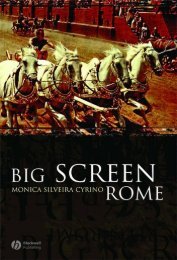Troy From Homer's Iliad to Hollywood Epic - Amazon Web Services
Troy From Homer's Iliad to Hollywood Epic - Amazon Web Services
Troy From Homer's Iliad to Hollywood Epic - Amazon Web Services
Create successful ePaper yourself
Turn your PDF publications into a flip-book with our unique Google optimized e-Paper software.
38 Joachim Latacz<br />
with a new text. Genette has developed a sophisticated theory that is<br />
applicable <strong>to</strong> practically all literature. Small wonder that Homer is his<br />
starting point. 4 (For comparison’s sake, consider the Bible and its influence.)<br />
As a result, <strong>to</strong>day we possess an enormously complex web of<br />
interrelated texts and visual narratives that deal with the matter of <strong>Troy</strong>.<br />
But all of them have certain features in common. They all fit or can<br />
be embedded in<strong>to</strong> a system of narratives that has become canonical.<br />
It allows of numerous variations and deviations from one version <strong>to</strong><br />
another, but it demands that its basic structure remain fundamentally<br />
unchanged. In turn, this system guarantees that readers and viewers<br />
can recognize the pattern. Themes and variations are familiar, useful,<br />
and pleasant each time we encounter the s<strong>to</strong>ry or parts of it. Within the<br />
overall frame, of course, much can be newly invented or made <strong>to</strong> serve<br />
new purposes, such as contemporary concerns. All this ensures the survival<br />
even across millennia of the original frame s<strong>to</strong>ry within which the<br />
new versions are placed.<br />
Evidently it is this technique that the author of our <strong>Iliad</strong> adopted<br />
when he <strong>to</strong>ok over the familiar s<strong>to</strong>ry of <strong>Troy</strong> as the frame within which<br />
<strong>to</strong> present his own narrative, voicing his own concerns. Consequently<br />
the s<strong>to</strong>ry of <strong>Troy</strong> and the Trojan War must have been available <strong>to</strong> him<br />
when he began the <strong>Iliad</strong> and must have afforded him a vast array of<br />
events and characters; otherwise we could not account for the large<br />
number of references or allusions that the <strong>Iliad</strong> contains <strong>to</strong> parts of the<br />
whole that are far removed in time from its own plot. Nor could we<br />
explain the presence in the <strong>Iliad</strong> of certain motifs that it does not fully<br />
develop but seems only <strong>to</strong> play with. This means that the matter of <strong>Troy</strong><br />
must have been quite ancient at the time the <strong>Iliad</strong> was composed and<br />
must have reached a level of great complexity. The very size of the <strong>Troy</strong><br />
s<strong>to</strong>ry as we know it makes the conclusion unavoidable that long before<br />
Homer many aoidoi had embedded their own versions in<strong>to</strong> the old frame<br />
of the matter of <strong>Troy</strong>, also expressing their own contemporary concerns<br />
and in turn contributing <strong>to</strong> the s<strong>to</strong>ry’s expansion. They are certain <strong>to</strong><br />
have used plot material already embedded by their predecessors, just as<br />
later generations of oral poets and eventually the literate poets from<br />
antiquity until <strong>to</strong>day were <strong>to</strong> do. The tradition of epic poetry composed<br />
and transmitted orally that has survived in<strong>to</strong> the twenty-first century,<br />
for example in Serbo-Croatia, provides us with a modern analogy. For<br />
professional reasons alone each of these modern aoidoi was and is keenly<br />
4 Gérard Genette, Palimpsests: Literature in the Second Degree, tr. Channa Newman and<br />
Claude Dubinsky (Lincoln: University of Nebraska Press, 1997).



